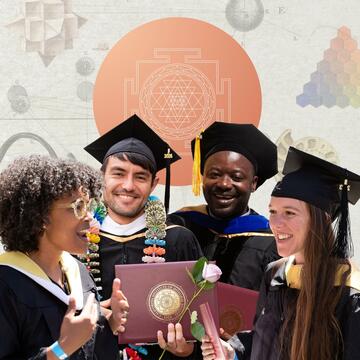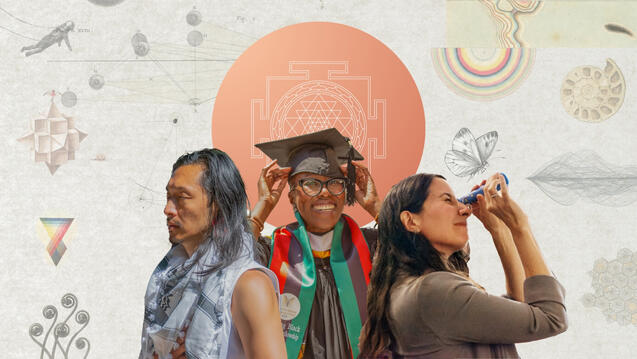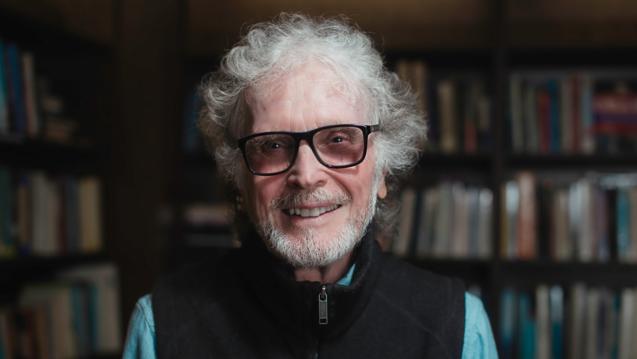A Free Online Overview with Jennifer Gruczelak, Nikole Moffett and Dennis Spears

Department of Research Psychology
Cultivating meaning and expanding scholarship in this leading-edge field
Our focus is on the lived experience of being human, including the spiritual, exceptional, and body. We are guided by and dedicated to offering integral education that honors intellectual excellence, perspective and practice that include spirituality and the body, and the transformative capacities of rigorous inquiry and writing. We offer a high quality, online Ph.D. for students in whole-person approaches to psychology.
Students are required to attend a residential intensive each fall. The remainder of the coursework is completed online. The course of study consists of core coursework, research courses, two comprehensive exams, and a dissertation written using original research.
Ph.D. in Psychology, Concentration in Integral Transpersonal Psychology
CIIS’ Integral and Transpersonal Psychology Ph.D. is one of the few programs in the world that offers an online Ph.D. in whole-person approaches to psychology. It is a research-oriented program dedicated to systematic knowledge-building and the advancement of transpersonal psychology. Whole-person psychologies expand the horizons of conventional Western psychology to include mystical and spiritual experiences that transform human consciousness. Our approach engages a comprehensive framework that includes the living systems of body, community, society, and the world as interconnected processes of evolution in a living, breathing cosmos. From this perspective, it becomes possible to ask new and compelling research questions that lie close to the heart of what it is to be human.
This research-oriented degree is designed for scholars and practitioners who want to develop new kinds of knowledge that emerge from transpersonal practices. Graduates will be able to contribute their enhanced expertise in areas such as psychotherapy, counseling, teaching, writing, research, organizational or business consulting, and social change work.
Ph.D. in Psychology, Concentration in Somatic Psychology
Somatic psychology is a holistic approach to psychology that recognizes the inseparable connection between mind, body, and spirit. It acknowledges the profound impact our physical experiences have on our psychological well-being and emphasizes the integration of bodily sensations, emotions, thoughts, and actions to facilitate deep healing and personal transformation. The doctoral program in Somatic Psychology at CIIS offers students the opportunity to immerse themselves in the history, current issues, and future potentials of this remarkable field while learning how to integrate awareness of bodily sensations, movement, breath, and nonverbal communication into their clinical work and scholarly endeavors.
This research-oriented degree is designed for scholars and practitioners who have established somatic practices and want to develop new kinds of knowledge that emerge from these practices. Graduates will be able to contribute their enhanced expertise in areas such as psychotherapy, social work, counseling, teaching, writing, research, policy development, and social change work.
Our Programs
We offer two concentrations in our doctoral degree to allow you to best explore your felt connection with a diverse, interconnected, and evolving world.
Whole-person education that expands conventional Western psychology to include spiritual and transcendent human experiences.
Deepen your work as a somatic psychology practitioner in this groundbreaking online Ph.D.
Faculty Research and Scholarship
Our faculty have a wide range of research interests, among them cultural and historical consciousness studies, the neuroscience of hypnosis and meditation and trauma-based psychological theories.

Exploring the Relationship Between Interoception, Mindfulness and Exceptional Experience
In this presentation, David Salisbury Brown Mitchell shares the finding of his study in which he and his colleagues conclude that meditation and meditative states of consciousness might be associated with increased reporting of exceptional experiences (ExE) otherwise known as unusual but not uncommon ways of experiencing the world, including experiences that are often labeled as “paranormal."

A Somatic History with Don Hanlon Johnson
In this delightful conversation on The Embodiment Podcast, professor Don Hanlon Johnson draws on his extensive well of experience and shares about his winding journey to becoming a Somatic Therapy practitioner.
FAQs
-
This is a part-time doctoral program, and the degree is structured so that students complete coursework in 3 years and then move to dissertation phase. Some students do complete in two years by accelerating the coursework. Usually, time to degree is 5.5 to 6 years.
-
Students entering the Psychology doctoral programs share an interest in whole-person approaches to psychology such as humanistic, transpersonal, holistic, integral, somatic, contemplative, Jungian, and East-West. This typically includes the following:
- Working professionals who wish to deepen their knowledge, advance their education, contribute to research, and bring greater meaning to their existing field of experience
- Thought leaders and activists who wish to use their education as a foundation for consulting, writing, or teaching in the public sphere
- Individuals who, after varied life experiences, are expanding their worldview into a more whole-person perspective
- International students from diverse places seeking graduate training and a whole-person education
-
Although a master's degree is required for acceptance into the Psychology Ph.D. programs, the degree does not have to be in psychology. Students with an insufficient background in psychology may be encouraged to take one or more foundational courses in psychology from CIIS’ Integral Counseling Psychology or Psy.D. programs, or at another community college or university.
-
No, the Research Psychology with a concentration in Integral and Transpersonal Psychology and Somatic Psychology programs are not clinical programs. The programs do not prepare students for licensure as psychological counselors, psychotherapists, or clinical psychologists. However, the degree is designed to serve students who have earned master’s in counseling or psychotherapy. It is expected that some of these students will pursue further doctoral studies researching topics related to counseling psychology, such as integral psychotherapy, somatic psychology, expressive arts therapy, drama therapy, and community mental health.
-
Graduates from the programs are expected to continue working in their established fields as psychotherapists, social workers, psychologists, counselors, consultants, activists, organizers, leaders, teachers, researchers, nurses, physicians, lawyers, or in fields related to personal development, social change, or environmental protection. Some who are entrepreneurially inclined may use their education as the basis for becoming consultants, writers, speakers, or workshop leaders. A few may go into academic teaching or research and publication.
-
Yes, the programs are conducted primarily online, with two intensives per year, in-person in fall, virtual in spring.
-
Yes, the programs are designed for part-time attendance. However, to qualify for financial aid, you must take six units per semester.
-
Yes, depending upon eligibility. Please consult the Financial Aid Office for specifics at 415-575-6122 or finaid@ciis.edu.
-
Yes. The University provides various forums during which you can meet with a faculty member to discuss your interest, including the biannual CIIS open houses, as well as various info sessions.
-
Prospective students interested in visiting CIIS can schedule an appointment with an admissions counselor. Admissions counselors are happy to discuss academic interests and goals and provide materials and financial aid information. Please contact Admissions at ckay@ciis.edu.
-
Government loans totaling up to $20,500 and various Institute scholarships are available. Additionally, some students are employed within the Institute as student workers (either for pay or tuition exchange). It is best to speak directly with a financial aid officer to understand the specifics, and to request that financial aid information be sent to you.
-
The Research Psychology department allows a maximum of six semester units to be transferred into the Ph.D. program. However, applicants with an insufficient background in psychology may be required by the Admissions Committee to take additional psychology courses as prerequisites. Students with previous doctoral coursework may request to transfer up to 6 units. The program chair reviews requests for transfer units.
Our Upcoming Events
A Faculty-Led Info Session with Cindy Shearer and Theresa Newman
Attend the Fall Open House on October 11, 2025 to get to know your admissions counselors and learn more about CIIS' bachelor's, master's, and Ph.D. programs.


Our Department in Action
Dr. Michele DeMarco, CIIS VP for Internal Relations, Integral & Transpersonal Psychology alum, and three-time heart attack survivor, new book offers a transformative new lens for healing from trauma, grief, and loss and building resilience.
Don Hanlon Johnson, Ph.D., a long-time professor of Integral and Transpersonal Psychology at CIIS, received a Lifetime Achievement Award from the United States Association for Body Psychotherapy.
Read about CIIS Professor Glenn Hartelius' research into a method to define and neurally measure waking states of consciousness










